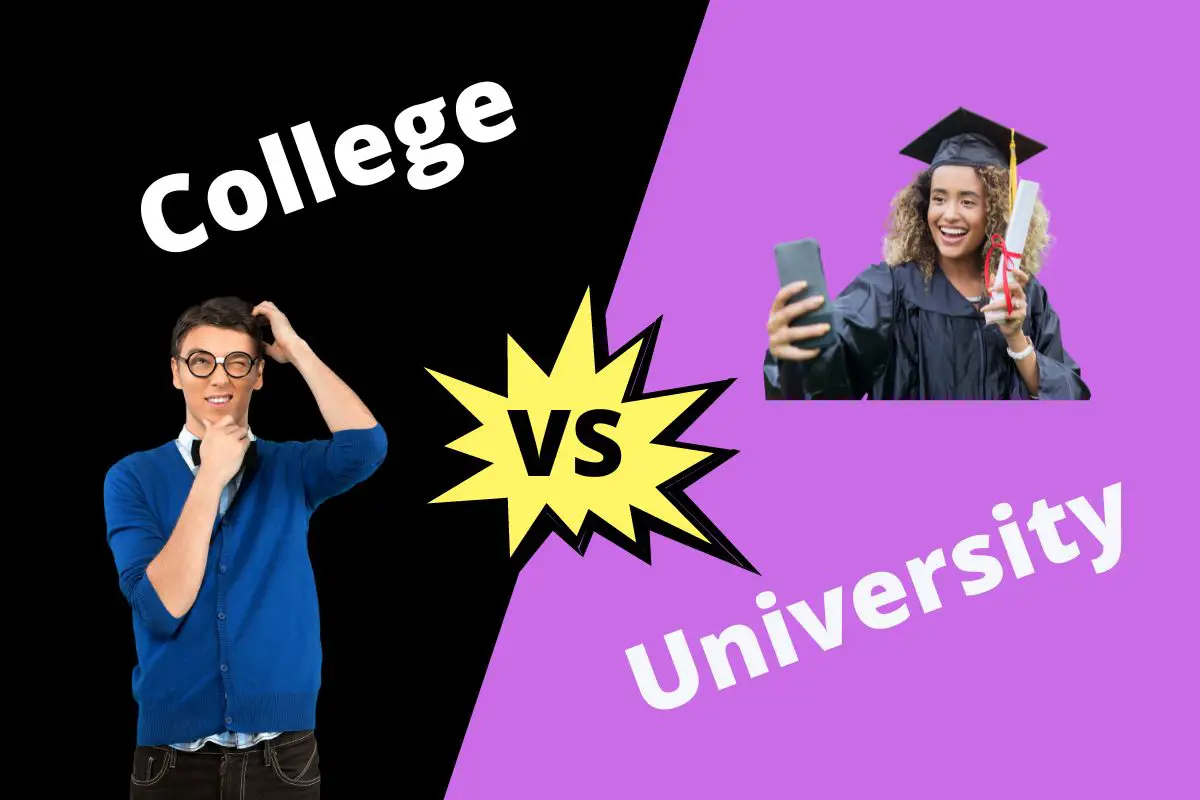Both colleges and universities are higher education institutions. Typically, colleges are smaller and don’t offer as many programs as universities do. Colleges are primarily for undergraduate programs, whereas universities are for postgraduate programs.
If you have recently completed high school, you might wonder where to pursue your higher education. Maybe a graduate degree is in your future.
Should you pursue a college or university? Explore the differences between the two.
Table of Contents
College vs University: Key Differences
| College | vs | University |
| College is a higher education institution with limited programs | Definition | University is also a higher education institution but provides varieties of programs |
| Colleges don’t have a vast infrastructure, and they are smaller | Infrastructure | Universities have a massive infrastructure, and they have a big campus than colleges |
| Colleges provide mainly undergraduate degrees | Degrees | Universities provide both undergraduate and postgraduate degrees |
| Colleges are divided into different academic departments | Departments/ schools | Universities are divided into different schools that further have academic departments |
| Colleges provide less financial aid | Financial aid | Universities provide financial aid to students |
| Colleges are private institutions | Private/ Public | Universities are often public institutions |
| Colleges don’t need to fulfill a lot of criteria to be declared as one | Criteria | Universities need accreditation; they must have all the resources required for research and non-research-based programs |
| The curriculum in colleges is limited | Curriculum | Large universities expose students to an extensive curriculum, and students get multiple options to pursue their interests in different fields. |
What is a College?
Colleges are educational institutions that provide undergraduate degree programs. Since colleges focus more on obtaining one particular degree, their infrastructure is not very big.
But there could be exceptions. For example, liberal arts colleges in the United States allow students to pursue education in broad academic fields like humanities, creative arts, science, etc.
Other Types of Higher Education
- Community or junior colleges
- Liberal arts colleges
- Technical schools
- Career colleges
- Vocational school
- Trade schools
Since colleges tend to be smaller, their curricula might not be as extensive. Plus, colleges are primarily private institutions, so the scope of receiving financial aid like scholarships and student loans is limited.

What is a University?
A university is a higher learning institution where students can pursue undergraduate and postgraduate programs. University is an umbrella term that may include a group of other educational institutions under them.
For example, Harvard University has a medical school, multiple graduate schools, a law school, a divinity school, Harvard College, 12-degree granting institutions, a college of engineering, and more.
Benefits of University Infrastructure
Within a university, the various schools and colleges have multiple departments, so there is a greater academic scope when you enroll in a university.
Universities can also give better exposure to students interested in extra-curricular activities like sports, cultural programs, student services, and other student programs. If you enroll in a university, earning a master’s degree may become a bit easier.
Most universities offer a 4+1 year program where you can earn your bachelor’s and master’s degrees in just five years. You don’t need to apply or sit at the entrance twice to seek admission to the master’s program separately.

Difference Between College and University
Programs
Usually, a college focuses mainly on undergraduate programs, whereas a university is a larger education institution that provides both undergraduate and graduate programs.
Degrees
A two-year college program can provide associate degrees, and a four-year program will provide bachelor’s degrees. Universities offer master’s degrees, PhDs, or doctorate degrees. Some universities provide integrated courses where students can obtain both bachelor’s and master’s degrees in a shorter period.
Infrastructure
Overall, college campuses tend to be smaller than university campuses. This means they typically have smaller class sizes than universities do.
Scope of Research
Since colleges are more focused on undergraduate teachings and attaining degrees, they usually don’t put enough emphasis on research programs. College education also puts more emphasis on the course or subject-oriented studies.
Universities focus more on research-oriented studies. Universities provide independent research opportunities and tend to prioritize them.
Types of Colleges and Universities
There are different types of colleges such as career colleges, community colleges, liberal arts colleges, trade schools, technical schools, and vocational schools. Colleges are smaller institutions and are often specialized in one particular area of study.
Universities are larger institutions comprising multiple schools and colleges, each dedicated to a different program. For example, Harvard University has Harvard Law school, Harvard Business school, Harvard medical school, etc.
Plus, colleges are divided into different departments. In contrast, universities are divided into other schools based on major types, as mentioned in the above section. Graduate degree programs are usually distinct from undergraduate education programs.
Diversity of Programs
Universities expose students to diverse curricula, cultures, campuses, and student communities. Due to the smaller size, you typically won’t find as many of these offerings in colleges.
Type of Institutions
Colleges are primarily private institutions. They don’t receive as many funds from the state government as universities, but larger universities are mostly government institutions. Private universities do exist, but they’re less common.
Scope of Financial Aids
Students usually don’t receive significant financial aid like scholarships from colleges, but universities often provide such aid to students.
Colleges and universities are great options for furthering your education after high school. You can expand your education with graduate studies or other advanced degrees after earning your undergraduate degree.
Be sure to choose between a college or university based on your academic goal, the scope of research, career opportunities, financial aid, and the co-curricular activities.
If you’ve enjoyed this post, check out our blog comparing ADD and ADHD.

